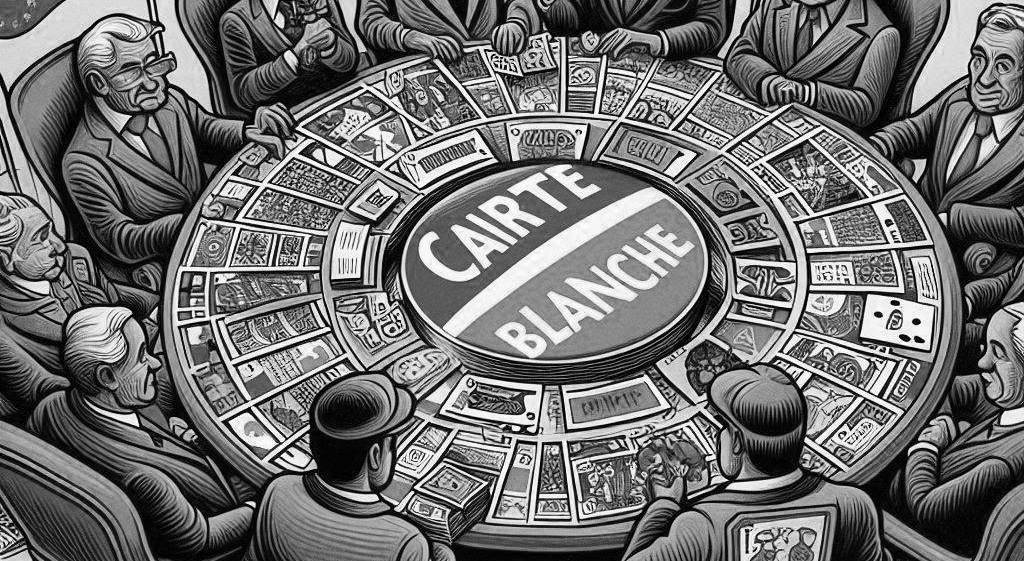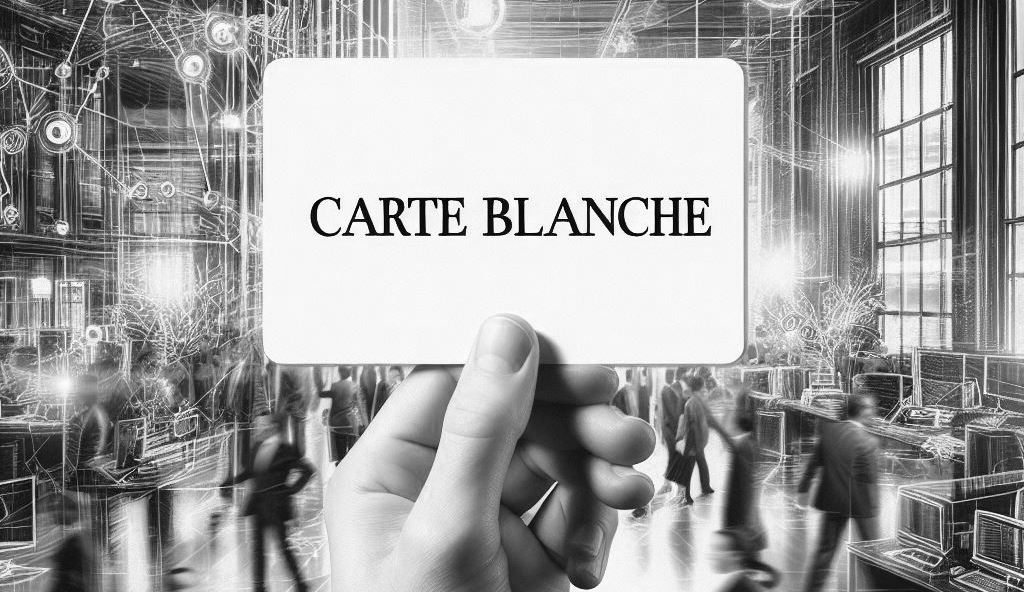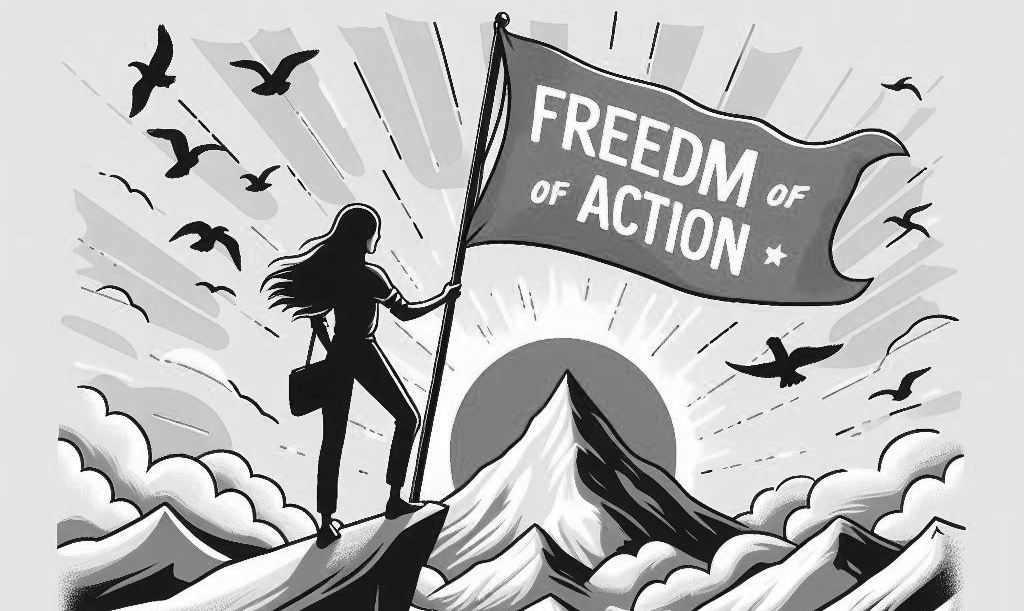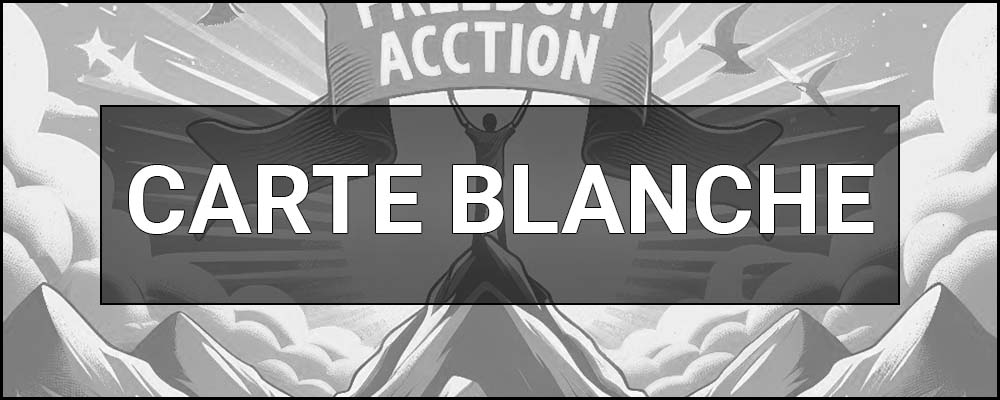Carte blanche is the authority or permission granted to a person or group to act at their own discretion without any pre-established restrictions or guidance.
What is CARTE BLANCHE — concept and definition in simple terms.
In simple terms, Carte Blanche is a kind of “white ticket” that gives a person or organization unlimited freedom of action or full trust to handle certain matters at their own discretion.
This means that you get support or permission to do whatever you think is right without having to ask for additional instructions or get approval. Imagine being given a paintbrush and paints, and the wall in front of you is your canvas, and you can paint whatever you want on it.

Etymology and historical origin of the concept of carte blanche.
Deep in history, the term “Carte Blanche” comes from the French language, where it literally translates as “white card”. The term was originally used in military and diplomatic circles to symbolize a power of attorney or authority granted to a person that allowed him or her to act at his or her own discretion in certain situations without being subject to external control or restrictions. Over time, this expression gained wider application and came to symbolize not only political or military trust, but also authority in the fields of culture, art, business, and personal relationships.
The evolution of the concept of “carte blanche” over time reflects the change in social structures and values. While in the Middle Ages it could mean the unlimited power of a monarch or feudal lord, in the modern world carte blanche is often associated with trust and respect for an individual’s professionalism in a particular field. For example, in the arts, it can be complete creative freedom of an artist or director, in business — the authority of a manager to dispose of company resources at his or her own discretion, and in scientific research — the freedom to experiment with new ideas without restrictions.
Thus, the concept of carte blanche plays a key role in the development of innovation, cultural progress and personal growth, allowing individuals and organizations to reach their potential without unnecessary restrictions. It emphasizes the importance of trust and responsibility in any field of activity, reminding us that freedom of choice and action are fundamental values of modern society.

Carte blanche in governance and politics.
In the political sphere, carte blanche refers to the granting of unlimited powers to a leader or government official, allowing him or her to make decisions without external interference or the need for further consent. It refers to a wide range of political actions, from legislative initiatives to diplomatic missions, and is often associated with critical moments in the history of states when quick and decisive action is deemed necessary to ensure national security or stability.
Historical examples of carte blanche:
In the historical context, the granting of carte blanche powers to leaders has deep roots and diverse implications:
- Franklin Delano Roosevelt during the Great Depression and World War II:
His New Deal and war measures were an example of the expansion of executive powers to deal with economic crises and military challenges, demonstrating how, in critical times, democratic states can give leaders significant power to manage a crisis. - Adolf Hitler in Germany:
The powers granted to Hitler after his appointment as Chancellor and the subsequent passage of the Enabling Act allowed him to consolidate a totalitarian regime, which demonstrates the risks of giving power to one person without control. - Winston Churchill during World War II:
His leadership and decision-making with great authority are considered key to strengthening the United Kingdom and its allies against Nazi Germany, emphasizing the importance of reliable leadership in times of war. - Joseph Stalin in the Soviet Union:
His rule was characterized by unlimited powers and repression of political opponents and civilians, exemplifying the negative consequences of authoritarianism caused by unchecked carte blanche. - Charles de Gaulle after World War II in France:
His role in the reconstruction and modernization of France, in particular during the creation of the Fifth Republic, demonstrates how the granting of broad powers can promote national unity and recovery.
These examples illustrate a wide range of situations, from effective crisis management to the risks of authoritarianism and dictatorship.
Thus, while carte blanche may be considered a necessary tool at critical moments to ensure effective governance and rapid response to emergencies, historical experience underscores the importance of a balanced approach, oversight, and accountability in its use. Ideally, carte blanche powers should be time-limited and accompanied by accountability mechanisms to prevent abuse and preserve democratic values.
The concept of carte blanche in military affairs and warfare in general.
In military history, the concept of carte blanche is often associated with granting commanders significant powers to make decisions that can decide the outcome of battles or even wars. This authority allows them to adapt to the circumstances on the battlefield without having to wait for instructions.
- Erwin Rommel during World War II:
Known as the “Desert Fox”, Rommel was given carte blanche by Hitler to lead the campaign in North Africa. His innovative tactics and quick decisions secured a number of victories over the Allied forces, although eventually limited resources and reinforcements led to his defeat. - Douglas MacArthur in the Korean War:
MacArthur received almost unlimited authority from the United States to conduct military operations in Korea. His decision to land in Inchon is considered a stroke of genius that led to a temporary retreat of North Korean forces, but his later actions and desire to expand the conflict caused disagreements with the US administration and led to his dismissal. - Valerii Zaluzhnyi during the Russian-Ukrainian war:
As Commander-in-Chief of the Armed Forces of Ukraine, Zaluzhnyi was given decisive authority in responding to Russian aggression, effectively leading the defense and counteroffensives. His leadership and strategic thinking helped to strengthen Ukraine’s defense capabilities and gain international support. - Napoleon Bonaparte in his campaigns:
Napoleon, as a political leader and military genius, had unlimited power as Emperor of France. His ability to make quick decisions and adapt on the battlefield brought France many military successes, although his desire to expand his empire eventually led to its downfall. - Horace Nelson at the Battle of Trafalgar:
Admiral Nelson, having received carte blanche from the British government, led his fleet to a victorious battle against the French-Spanish fleet. His unpredictable tactics and courage ensured Britain’s hegemony on the seas.
These examples demonstrate how, in military affairs, carte blanche can be a tool for achieving strategic advantages, but also carries the risks of over-extending a war and unpredictable consequences.

The role of carte blanche in the legal system.
In the legal sphere, the concept of carte blanche is used in the context of contractual relations and the permitting system, where one party is granted a wide range of decision-making powers without the need for additional approval or review by the other party. This may include powers of attorney, license agreements, and service agreements where one party is entitled to act at its own discretion within the scope of the contract.
However, granting carte blanche powers in legal contracts has both potential benefits and risks. On the one hand, it can promote flexibility and efficiency in solving problems, allowing a person or organization to respond quickly to changing circumstances without having to constantly negotiate every step. Such autonomy can be particularly valuable in situations where decisions need to be made quickly or where one of the parties has a high level of trust and professionalism.
On the other hand, there are significant risks associated with excessive power without proper oversight. This may include abuse of power, misuse of resources and corruption, as well as decisions that are not in the best interests of the other party. Such situations can lead to legal disputes, loss of reputation and financial losses.
Examples from the legal sector:
In the context of legal agreements, the existence of real-life examples where carte blanche powers have been used to advantage or led to controversy demonstrates the wide range of applications and potential consequences:
- The agreement between Apple Inc. and its component suppliers:
Apple sets strict requirements for product quality and delivery times, giving certain suppliers carte blanche to produce components. In return, the company ensures regular monitoring of quality and efficiency standards. - Cooperation between SpaceX and NASA:
As part of this agreement, SpaceX received significant autonomy in making technical decisions during the development and launch of spacecraft. However, the agreement provides for strict safety and reliability criteria, which are ensured through rigorous inspections and tests. - Construction contracts between municipalities and contractors:
Local governments often give contractors carte blanche to implement infrastructure projects, subject to budget, time, and quality standards. Phased reports and independent audits are used to monitor progress. - License agreements between pharmaceutical companies and research institutes:
These agreements allow research institutes to conduct experiments and develop new medicines with minimal interference from the pharmaceutical company, while ensuring control over compliance with ethical and regulatory requirements. - Franchise agreements in the food service industry:
Franchises, such as McDonald’s, provide franchisees with a significant degree of independence in running their business, while setting clear standards for service, product quality and marketing. The franchisor regularly monitors compliance with these standards to ensure the brand’s reputation.
Therefore, the issue of granting carte blanche in legal agreements requires a balanced approach, where it is necessary to find a balance between trust and control to minimize risks and ensure mutually beneficial cooperation.

Carte blanche in the creative and artistic spheres.
In the artistic sphere, this concept opens up unlimited spaces for creativity, allowing artists, writers, filmmakers and other creators to act without restrictions to realize their wildest ideas and visions. This concept, which translates to “complete freedom of action,” fundamentally changes traditional approaches to art creation, stimulating innovation and experimentation.
Examples from various fields of art:
- Literature:
In literature, carte blanche allows writers to experiment with forms and genres, breaking stereotypes and creating new works. For example, James Joyce uses unconventional narrative techniques in his novel Ulysses, which was made possible by creative freedom. - Cinema:
In cinema, directors, given carte blanche, often create films that deviate from the classical canons, offering the viewer a new experience. Quentin Tarantino is known for his unique style, which would not have been possible without complete creative freedom. - Visual arts:
In the field of visual arts, carte blanche allows artists to go beyond traditional techniques and styles. As an example, Banksy uses graffiti to express socially critical ideas, often sparking heated debates in society. - Music:
In music, carte blanche opens up opportunities for experimentation with sound and genres. Radiohead’s album “Kid A” moved away from the traditional rock sound to electronic and abstract art, which changed the way we think about music genres.
This unlimited freedom in art not only opens up new horizons for artists, but also enriches the cultural space, offering viewers, readers, and listeners new forms of perception and interpretation of reality. However, it also requires a high level of responsibility and self-discipline from artists, as unlimited freedom carries the risk of narcissism and loss of connection with the audience.

Carte blanche in business and management.
In the world of business and management, the concept of carte blanche plays a critical role in shaping corporate culture and leadership, giving CEOs the authority to make bold decisions without the need for constant approval from the board of directors or shareholders. This approach can significantly speed up the decision-making process and promote innovative development of the company, but at the same time requires a high level of trust and responsibility on the part of the CEO.
Real business examples:
- Steve Jobs at Apple:
When Jobs returned to Apple in 1997, he was given carte blanche by the board of directors to realize his vision for the company. His decision to focus on a limited number of products and the introduction of innovative technologies led to the creation of the iMac, iPod, iPhone, and iPad, which radically changed the market and strengthened Apple’s position as a technology leader. - Elon Musk at Tesla and SpaceX:
Musk is known for his innovative approach to management and has received carte blanche from investors to implement ambitious projects. His ability to take risks and implement projects that seemed impossible (Tesla electric cars, SpaceX commercial space flights) has significantly influenced the industry and opened up new areas of development. - Jeff Bezos at Amazon:
Having received carte blanche from shareholders, Bezos transformed Amazon from an online bookstore into one of the largest retailers and cloud service providers in the world. His focus on innovation and customer focus have been key to the company’s success. - Satya Nadella at Microsoft:
After being appointed CEO in 2014, Nadella was given carte blanche to refocus the company on cloud and mobility. His leadership has helped Microsoft become one of the most valuable companies in the world once again. - Indra Nooyi at PepsiCo:
As CEO of PepsiCo, Nooyi has been given carte blanche to implement a “Performance with Purpose” strategy focused on healthy eating. Her initiatives to diversify the company’s product line have contributed to sales growth and increased corporate responsibility. - Demis Hassabis at DeepMind:
The founder and CEO of DeepMind, an artificial intelligence company, Hassabis was given carte blanche by Alphabet (Google’s parent company) to research and develop advanced artificial intelligence technologies. This led to the creation of AI that defeated human champions in complex games, demonstrating the unprecedented capabilities of machine learning and artificial intelligence. - Vitalik Buterin at Ethereum:
As a co-founder of Ethereum, Buterin was given carte blanche by the cryptocurrency community to develop a blockchain platform supporting smart contracts, which opened up new opportunities for decentralized finance (DeFi) and other applications. His innovative approach to blockchain technology has not only helped to expand the possibilities of cryptocurrencies, but has also laid the foundation for numerous startups and applications that use blockchain technology.
These examples demonstrate how carte blanche in the hands of visionary leaders can foster radical change and innovation in business, while also requiring a high level of strategic thinking, responsibility, and risk-taking.

Ethical considerations regarding the concept of carte blanche.
In the context of ethical considerations, the issue of granting carte blanche powers in various spheres of life raises significant moral dilemmas. On the one hand, it can promote innovation, efficiency, and flexibility in decision-making. On the other hand, it creates risks of abuse, negligence, and loss of control, which can have far-reaching consequences.
- Moral dilemmas: Granting carte blanche authority, especially in military, political and corporate structures, requires a careful balancing act between the need for efficiency and the risk of abuse. Ethical challenges arise when the autonomy granted to individuals or organizations may lead to decisions that are contrary to the overall interests of society or particular groups.
- Public attitudes: Opinion polls and studies often indicate divided views on the acceptability of carte blanche powers. According to studies, the majority of the population tends to support limited powers with clear mechanisms of responsibility and control, emphasizing the importance of transparency and accountability in any field of activity.
- Impact on innovation: On the other hand, the analysis of cases where carte blanche powers have been successfully applied shows that they can significantly contribute to innovative development and progress. However, the success of such initiatives depends on the existence of a strong ethical framework and a culture of responsibility within the organization.
- Ethical codes and regulations: Developing and implementing codes of ethics governing the granting and use of carte blanche authority is becoming a necessary tool to prevent potential abuse. This includes establishing clear criteria and procedures for monitoring and evaluating actions that affect a wide range of stakeholders.
Conclusion.
In this article, we have examined the concept of carte blanche and its application in a variety of areas: from politics and military affairs to business, art and legal frameworks. We have shown that granting unlimited authority can foster innovation and efficiency by allowing leaders and creators to quickly adapt to changes and challenges. At the same time, we emphasized the significant ethical dilemmas and potential risks of abuse that can arise without proper controls and a balance of authority. Public debate and ethical considerations proved to be key in assessing the acceptability of carte blanche in different contexts, emphasizing the need to find a middle ground between trust in professionals and the need to ensure transparency, accountability and ethical engagement.

FAQ (Frequently Asked Questions):
Carte blanche is the authority or permission to act with complete freedom or without any restrictions in a certain area or situation.
Carte blanche can be applied in various fields, including politics, military, business, art, and legal relations.
The granting of carte blanche facilitates quick decision-making, stimulates innovation and creativity, and allows for an effective response to changes.
The main risks include potential abuse of power, negligence, and decision-making that may be detrimental to the interests of the organization or society.
Responsible use can be ensured through the establishment of clear criteria, reporting mechanisms, and regular monitoring of activities.
The effectiveness of carte blanche depends on the context, the skills of the person to whom it is granted, and the mechanisms of control and accountability.
In everyday life, carte blanche can be granted in the form of powers of attorney or special powers in family or business relationships, but it is usually accompanied by certain restrictions and responsibilities.




